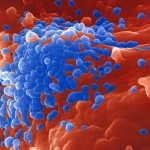Lien vers Pubmed [PMID] – 15604439
J. Gen. Virol. 2005 Jan;86(Pt 1):125-9
Virus genomes from the same family may exhibit a wide range in their DNA GC content, whereas viral hypermutants differ substantially in GC content from their parental genomes. As AT-rich DNA melts at lower temperatures than GC-rich DNA, use of a lower denaturation temperature during PCR should allow differential amplification of AT-rich genomes or variants within a quasispecies. The latter situation has been explored explicitly in a two-step process by using a series of well-defined viral sequences differing in their AT content. Firstly, the lowest denaturation temperature (T(p)) that allowed amplification of the parental sequence was determined. Secondly, differential amplification of AT-rich viral variants was obtained by using a denaturation temperature 1-3 degrees C lower than T(p). Application of this sensitive method to two different viruses allowed us to identify human immunodeficiency virus type 1 G–>A hypermutants in a situation where none were expected and to amplify AT-rich variants selectively within a spectrum of poliovirus mutants.

